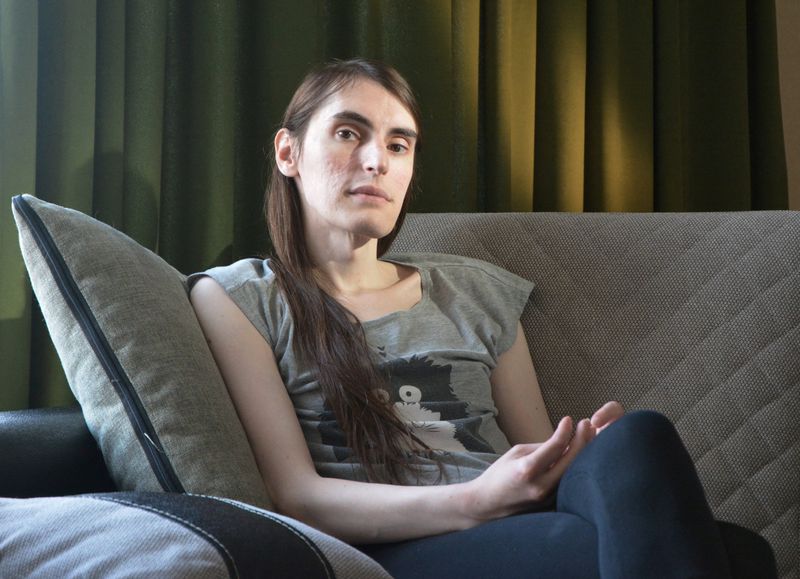Trans advocates in Russia brace for proposed gender surgery ban
2023.07.12 07:47
5/5

© Reuters. Elle Solomina, 36, a Russian transgender woman from Saratov, attends an interview in Tbilisi, Georgia June 21, 2023. REUTERS/David Chkhikvishvili
2/5
(Reuters) – Elle Solomina is 36, but she says her life truly began in 2021, when she changed her gender to female in her official Russian identification documents.
The IT worker is now watching the path she took to self-acceptance crumble, as Russia is poised to outlaw gender changes in IDs and gender-affirming medical care, including surgery.
“This is in its purest form a fascist law,” Solomina told Reuters from the Georgian capital of Tbilisi, where she fled after Russia invaded Ukraine last year. “I have not found any explanation for it, except that in a totalitarian system, the population must live in fear.”
The draft legislation, which received initial backing last month from the lower house of parliament, is the latest phase in a widespread crackdown on LGBTQ rights, which President Vladimir Putin seeks to portray as evidence of moral decay in Western countries.
News of the ban has raised alarm among transgender advocates, who warn of dangers to psychological and physical health and long-term problems posed by a potential illicit hormone drug market.
Russian state news agencies have reported that the bill will go into a second reading on Thursday. Bills require three readings, approval by the upper house of parliament, and signing by the president before becoming law.
Nef Cellarius, programme coordinator of LGBT rights group Vykhod (“Coming Out”), told Reuters that requests for support sessions soared from a dozen in a normal month to 45 in June as news of the law broke.
“I’ve received many letters with phrases like, ‘I don’t want to live anymore,’ ‘I don’t know what to do,'” Cellarius said, speaking from an undisclosed location. “Trans people in Russia are scared and they are desperate.”
Advocates say the ban has been over a decade in the making.
Last December, Putin signed a law expanding restrictions on the promotion of “LGBT propaganda,” effectively banning any public expression of their lifestyle by lesbians, gays, bisexuals and transgender people in Russia.
Earlier legislation has been used for years to stop gay pride marches, detain activists, and, many LGBTQ Russians say, instil a culture of fear among those who live what the Kremlin calls “non-traditional lifestyles”.
“We are preserving Russia for posterity, with its cultural and family values, traditional foundations, and putting up a barrier to the penetration of Western anti-family ideology,” Pyotr Tolstoy, deputy chairman of the State Duma, said during the bill’s first reading in June.
Observers believe the draft law’s broad language could also outlaw hormone therapies.
Richard Volkov, a 26-year-old musician from Moscow, says fellow transgender men he knows are scrambling to change their IDs and start hormone regimes.
“This is the worst thing my country could do, he told Reuters from Sarajevo, where he moved after the war began. “It seems that if I simply tell myself that I exist, I am already violating the law.”
Russia has allowed gender changes on IDs since 1997, four years after it decriminalised homosexuality. The number of transgender people in Russia is unknown, but in other countries it hovers around 0.5% of the adult population.
Last year 996 people applied to change their gender on their passports in Russia, according to the health ministry. The number of those who underwent surgery was even smaller.
Doctors who perform such procedures say the ban could stimulate a black market for substitute hormones, further endangering patient health.
Transgender people “will self-medicate, prescribe and take these drugs for themselves”, Dr. Andrei Istranov, a plastic surgeon who treats transgender patients, told Reuters in an interview in his private clinic in Moscow. “Psychologically, patients will definitely suffer.”
Cellarius says the law may fuel an exodus of transgender people from Russia, but Vykhod will focus on supporting those who remain.
“The whole point is about changing the situation in Russia, not evacuating everybody,” he said. “We are ready to fight back.”








